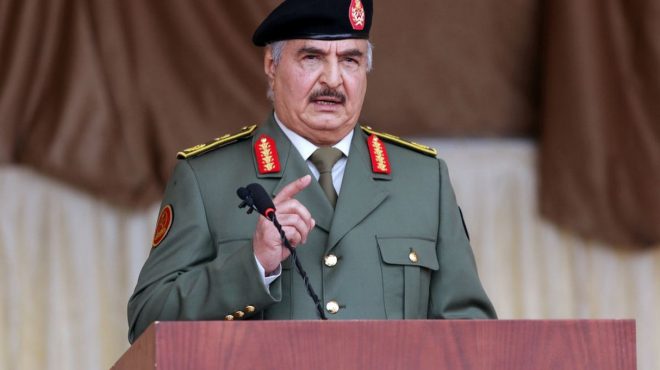The Libyan National Army (LNA) of eastern-based commander Khalifa Haftar clashed with Chadian rebel forces in the south of Libya on Tuesday and Wednesday, both sides said.
The fighting underscores the risk of further instability in the Sahel region, where an array of groups operate across borders and where fighting has created space for militant organizations.
Statements from the LNA, which holds most of eastern and southern Libya, said it was engaged in military operations against what it called terrorist groups and the Chadian opposition.
The rebel group Front for Change and Concord in Chad (FACT) said via social media that its positions on the frontier had been attacked by Haftar’s forces, fighting alongside what it said were Sudanese mercenaries and French troops.
The LNA said it had carried out airstrikes and was conducting aerial patrols. FACT said French airstrikes had hit their positions.
The French army said it had no forces on the ground or in the air in that area.
FACT had been based in Libya and fought alongside the LNA during periods of Libya’s civil war, receiving heavy arms from Haftar, researchers say. read more
In April, FACT advanced into northern Chad, battling the army there. Chadian authorities said president Idriss Deby, who had ruled for 30 years, was killed in the clashes. His son has taken over as transitional president.
The LNA, which was backed in the Libyan conflict by the United Arab Emirates, Russia, and Egypt, also used fighters from Sudan and Syria, as well as those provided by the Russian Wagner Group, a U.N. panel of experts, has said.
The UAE deployed drone strikes in support of the LNA during its foiled 14-month offensive to capture Tripoli, which ended last year. The U.S. military has said that Russia flew jets to Libya last year to support LNA operations.
Major fighting in Libya’s civil war has been paused since the LNA offensive ended last year and both sides have accepted a ceasefire, an interim unity government, and the idea of elections, although mercenaries remain dug in on both sides.
France intervened in the Sahel in 2013, sending forces to help fight militants in Mali, Niger, Burkina Faso, and Chad, but grew impatient at political turmoil and said in July it would halve its troop numbers from the 5,000 then deployed.
 Alghadeer TV Alghadeer TV
Alghadeer TV Alghadeer TV

